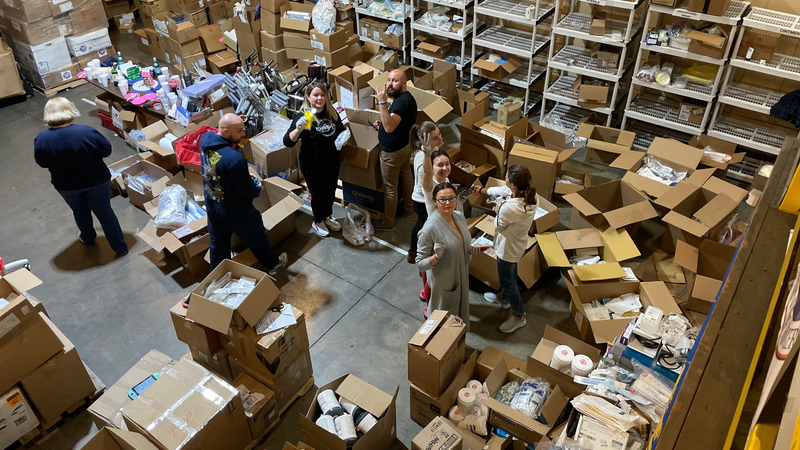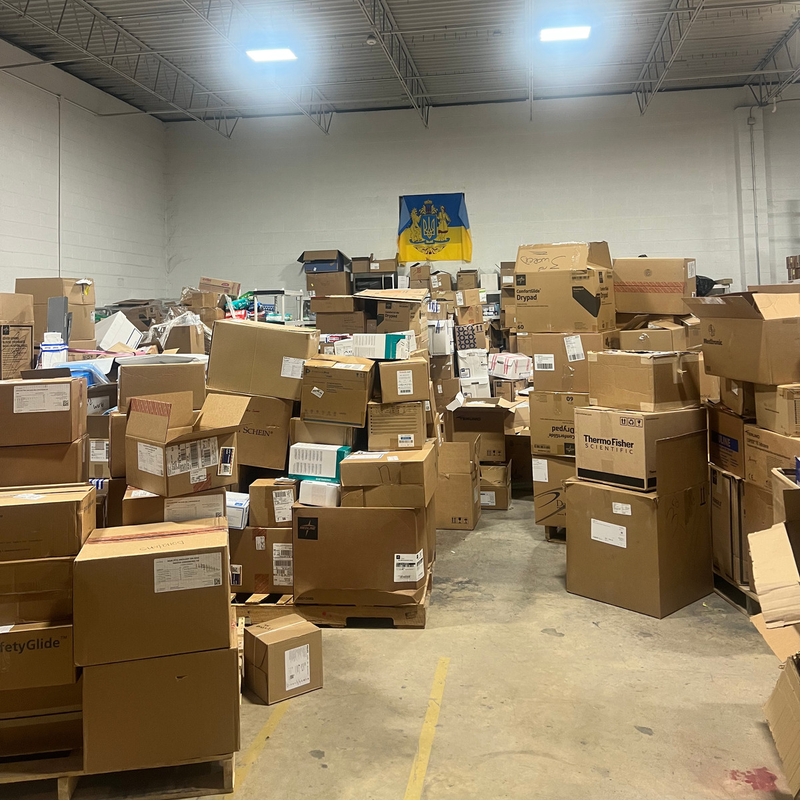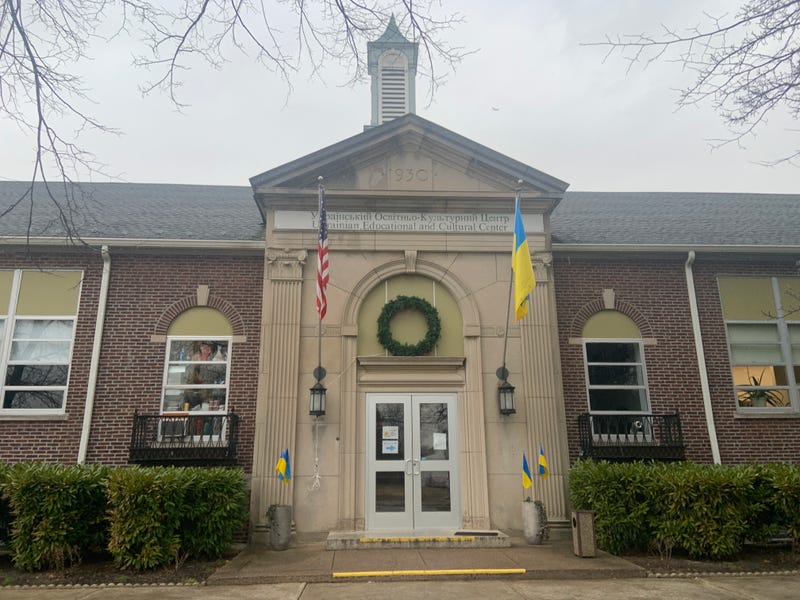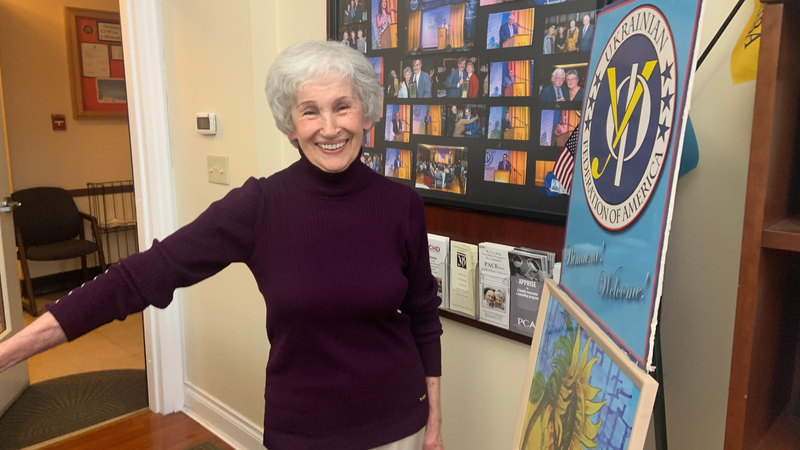
This story is part of a KYW Newsradio series looking back on how the war in Ukraine continues to affect the Philadelphia region a year after the Russian invasion.
PHILADELPHIA (KYW Newsradio) — Inside a warehouse in Lower Southampton Township, Bucks County, last week Thursday, Ukrainian Federation of America volunteers were sorting, packing and preparing donated medical supplies and equipment for shipment to health care facilities in Ukraine.
“Surgical instruments, medical supplies, medical computers, patient monitoring devices, medications, wound care,” said Marta Pilip, director of the group’s humanitarian aid division. “We send some hospital beds, hospital cribs, hospital mattresses.”
She said the Jenkintown-based nonprofit relies on the work of volunteers, all with families and full-time jobs, who gather after work to prepare the shipments.
In all, so far, they have sent “over 200 pallets and supplied over 45 hospitals and medical facilities in Ukraine,” Pilip said.
The items have been donated by U.S. hospitals, she said.


“The need is there. Every day, hundreds of Ukrainians are dying and thousands of Ukrainians are wounded. The medical system is overwhelmed,” Pilip said.
When the war started, the organization decided to focus on health care efforts because there are doctors among their membership, she said.
“We have been working in medical health with Ukraine. We have experience with that, so we decided to use that experience and help in the medical field,” said Pilip.
Adapting to changing needs
Even though it was initially hard to accept the reality of war when the Russians invaded a year ago, everybody was emotionally involved and they wanted to help, said Dr. Zenia Chernyk, president.
“Everybody was helping not only 100%,” Chernyk said, but “200%.”
The UFA does a lot of work in Ukraine for wounded soldiers and for PTSD programs.
“We actually have neurosurgeons and other specialists here in the United States for training. And we initially organized a group of ER physicians and trauma physicians — American physicians who wanted to go to Ukraine, even all the way to the hospitals that are at the front of the war, to help. We had 52 ER physicians and surgeons volunteer to go to Ukraine,” Chernyk said.
As the war continues, those needs on the ground change, “so we are reassessing, reevaluating,” she said.
“[Ukrainian medical teams] are now beginning to get into more specialized surgical procedures, because they’re receiving people who have been literally mangled on the front,” Chernyk said, “and we are now specifically collecting equipment from donations and … also purchasing it for those specific, highly specialized surgical procedures.”

The organization is also involved in a United Nations-sponsored health care program, Chernyk said.
“They are sponsoring mobile units for [gynecological] care and prenatal care for displaced women,” she said. “They are sponsoring 12 regions in Ukraine where they are sending these units, and we are running this program with our medical representative who lives in Ukraine.”
In addition to humanitarian and medical efforts the organization facilitates social services for refugees. The operation out of Jenkintown is part of a huge network of organizations and individuals around the world, doing whatever it takes to help the people of Ukraine with humanitarian aid and medical needs, and to support the war effort.
The organization's efforts are a labor of love, Chernyk said, and no board member or volunteer is paid for their work. But outside of the Ukrainian Federation of America, attention to the war effort is waning.
“Now, as the war continues, people are getting used to it, and they think it is the new normal and there is less enthusiasm with doing something for other people,” said Chernyk
Related Audio
‘If I don’t go, I may regret it for the rest of my life’
But the story of one Pennsylvania man stands as a reminder of the good a single person can still do.
Last March, KYW Newsradio reported on a Bucks County computer programmer who was heading to Ukraine. The man, who we are calling “Sasha,” said at the time that he would be using his brain to help Ukraine — but if need be, he said, he would fight.
Sasha has dual citizenship. When he left the United States last year, Ukrainian men between the ages of 18 and 60 were not permitted to leave Ukraine. He was advised at the last minute to travel with his U.S. passport, so he could cross the Ukrainian border to help humanitarian efforts based in Poland.
Sasha returned home about two months ago after putting his knowledge to good use for the better part of a year.
“Russia constantly destroys Ukrainian energy infrastructure. They have resumed not only rockets, they are now using drones to bombard citizen infrastructure. Things have gotten way worse,” Sasha said.
“One time, I remember, we woke up from explosions. And we came to the window and we saw huge rockets flying above us and hitting something in the area not far from us, so the whole building was shaking for quite a while.”
Sasha said he did not engage in combat but he did various things throughout his stay including blocking the Russians from using the internet by reconfiguring routers.
“A huge amount of routers have vulnerabilities that would allow you to log on … and change its integration,” he said. “Now every user that is using the router, would not be able to use the internet, because every time they type something, they would be routed to the Ukrainian website about the war.”
After that, Sasha helped with humanitarian aid logistics.
“When we were in Ukraine there were a whole lot of people helping us,” Sasha said.
Related Audio

A year later, he stays humble.
“I’m just one of those cogs that is turning in the machine,” Sasha said. “The way that it works — you find other people, more cogs, in this machine to join this effort. And it starts turning. And that’s how it keeps working.
“It’s a network. You build a network of people and organizations, and they all have different abilities, different resources. And when you combine it together, you can do a lot.”
Sasha was rehired at his computer programming job in the U.S.



